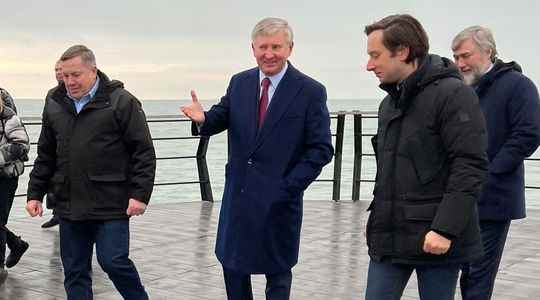At the beginning of March, while fighting raged in the north of kyiv, Hennadiy Druzenko was looking for a place that could accommodate a field hospital. This veteran of the Donbass war in 2014 thinks of the empty villa of Viktor Medvedchuk, a pro-Russian oligarch who is the godfather of Putin’s daughter – he was at the time under house arrest elsewhere for “high treason”. Occupying his house would be a fair return. Problem, it is under construction… The hospital is installed at its neighbor, Viktor Pintchouk, famous magnate of the iron and steel industry. Resistance fighters install their medicine boxes under the golden moldings and the crystal chandelier of his huge residence. Presented with a fait accompli an hour later, the owner approves.
The tide has turned since the beginning of the war for the greatest fortunes of Ukraine, such as Rinat Akhmetov, Viktor Pintchouk or Ihor Kolomoisky, all owners of yachts, planes, media, football clubs, banks or industries. More powerful than the presidents, they rained or shined on the Rada (parliament) for thirty years. “None was really pro-Ukrainian or pro-Russian; they were above all pro-business, deciphers political scientist Silviya Nitsova, researcher at the University of North Carolina. Viktor Medvedtchouk was the only exception.” With the closure last year of its very popular television channels relaying the voice of the Kremlin in Ukraine, the latter had lost influence – and Moscow. Arrested on April 12, “Putin’s friend” is now imprisoned.
Supporting the state, “a question of survival”
For others too, times have changed. “At the time of the Maidan revolution in 2014, the annexation of Crimea, then the war in Donbass, the oligarchs were still acting according to their own interests,” explains Silviya Nitsova. Today, they have no choice but to support their government. Rinat Akhmetov, the country’s first fortune and strongman of Donetsk, has thus clearly sided with kyiv. The ex-owner of the Azovstal factory, destroyed by enemy artillery, saw more than a third of his fortune fly away… “Supporting the state is now a matter of survival for the oligarchs, because it’s the army that defends their property,” insists former journalist Serhiy Lechtchenko who has become an anti-corruption adviser to President Volodymyr Zelensky.
“The oligarchs have never been as weak as they are today”
Since February, Akhmetov claims to have given more than 100 million euros to the army and civilians. At the same time, he is suing Moscow before the European Court of Human Rights. In a comment written to L’Express, he even pleads for “a new and European Ukraine, endowed with strong institutions, the rule of law, clear anti-corruption rules”. This turnaround makes anti-corruption activists smile. “His contribution represents peanuts compared to what he has stolen for years, squeaks Tetiana Shevtchouk, he could have financed several armies.” According to this researcher from the Center for Action against Corruption, the Ukrainian oligarchs have long represented “a kind of armed arm of Moscow”: for years, they have contributed to undermining institutions and slowing down kyiv’s rapprochement with the Union European.
Since the start of the invasion, Ihor Kolomoisky, who owns the largest bank in Ukraine, has been strangely silent. The billionaire under American sanctions, who also has Israeli and Cypriot passports, and who would live in his Carpathian ski resort, assured that the nature of his aid will be revealed “after the victory”. Marginalized by the pro-Russian president Viktor Yanukovych, he had financed armed volunteers to resist in Moscow in 2014. Later, he will launch on his channel the famous series of the future president Zelensky, servant of the people.
“The oligarchs have never been as weak as today, assures Serhiy Lechtchenko, to the government. This is the best time to fight them.” Under pressure from his Western partners, President Zelensky seems to want to clean up. In June, a law on “de-oligarchization” signed in 2021 came into force. The television channels, which once served the interests of this or that billionaire, now speak with one voice to denounce the Russian invasion. It took a war for the oligarchs to bend, forced and forced, to the general interest.
This article is from our special issue “We Ukrainians”on newsstands August 24, in partnership with BFM TV.
